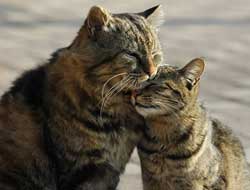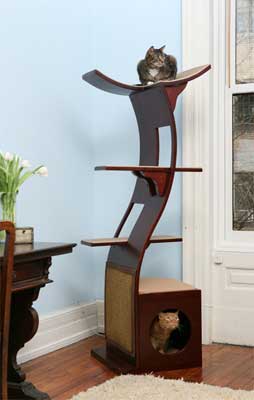Shy Cat Behavior And Solutions
A shy cat, a timid cat an introverted cat, whatever you want to call them can be a very sad behavior to witness in your pet. It can be distressing not only for the cat but also for you to watch a cat seem afraid and lonely most of the time.
However there are things that you can do to help your cat overcome some of these fears and become a happier cat.
The Traits Of An Introverted Cat
Timid Cats And Shy Cats
A timid cat should not be confused with a cautious cat, one who is making sure that they keep out of trouble. It is a natural instinct for most cats to keep out of the way until they can be sure that they are safe and that you mean them no harm.
However a cat with a timid nature displays a much more extreme behaviors and reactions to the world around them.
I'm sure we've all come across a cat like this at some point in our lives. They run and hide from strangers who enter the house, never come near to be petted and like to hide away all the time. Even the cat's owner may find it difficult to connect with them.
The Causes
Why some cats are like this and other are not can be due to many things, such as:
Un-socialized from an early age - It is important for kittens, especially during the first few weeks and months of their lives to have lots of contact with people and other animals. Being handled and used to the different scents and behaviors of other creatures, as well as social interaction through play is essential for a well balanced pet in later life.
Sadly some cats do not receive these early experiences and so the world and the people in it becomes a fearful thing. One in which they are unsure of how to react other than to hide away.
Mis-treatment - Unfortunately for some cats they experience cruelty or unkindness during their lifetime and quite naturally they become afraid of all people due to this.

Demanding Cats
Another trait of an introverted cat is one that can be very dependent on its owner. In other words it is only happy when you are around and paying them lots of attention. This is also known as separation anxiety.
This behavior will be displayed as:
- Following you around and getting under your feet all the time.
- Crying for food to be picked up or for attention all the time.
- Very vocal
- Destructive behavior such as, clawing furniture or chewing things when you are away from the home.
- Defecation, urination or sometimes even vomiting, when you are away or they are left on their own.
Now some of this behavior may seem sweet at first, after all we all like to be wanted and needed, but it can be very difficult to handle after awhile.
The Causes
Again this sort of behavior can be caused due to a lack of self confidence and assurance which would have been developed during their early life.
Cats learn through play and experience and if they have only negative experiences, such as being neglected or not fed properly, they can become nervous and lack self confidence, perhaps always worrying where the next meal will come from.
How To Care For A Shy Cat
You may never be able to completely change your introverted shy cat into a outgoing and confident cat but you can help them over time to reduce their behaviors and learn to trust you and their surrounding more.
Here is some basic advice as to how to help your cat lead a happier life.
Reassurance
- Always allow a shy cat to come to you. Never try to grab it or force it to be picked up or stroked, this will only make things worse.
- Instead speak softly and calming to the cat.
- Try to be as low down to the cat as possible, they will feel less threatened. If you cannot get low down, provide lots of high places your cat can sit.
- Gentle slow strokes will help to relax the cat.
- Provide places where the cat can feel safe and hide if they want to, such as cushions up high, or in cupboards. You can even buy soft covered beds, which allows your cat to feel safe and secure and hidden.
Distraction
A cat that has something new to explore and discover will always be a more assured cat. Play is also an essential part of bonding so the more confident your cat is within its own surrounding and with you the better, toys and play can help provide this confidence.
As mentioned before provide lots of climbing places, such as posts and towers. These also allow your cat to play and scratch which are essential for a cat to feel secure and claim as their territory.
Alternate toys regularly so that they do not become bored with them. Provide new toys from time to time and ensure that you do spend some time interacting with your cat with play.
See my page about the types of cat toys available.
Companionship

For those cats who seek attention from you all the time, another cat could provide the answer in the form of companionship.
Of course this may not always be the case for all cats but it is definitely worth thinking about. For some cats loneness is a real source of anxiety and so having another cat around or at least the ability to find other cats outside is a good way to help your cat through this anxiety.
Kittens will often benefit from an older cat being around, so if you do adopt a single kitten, do consider also adopting an older cat too.







